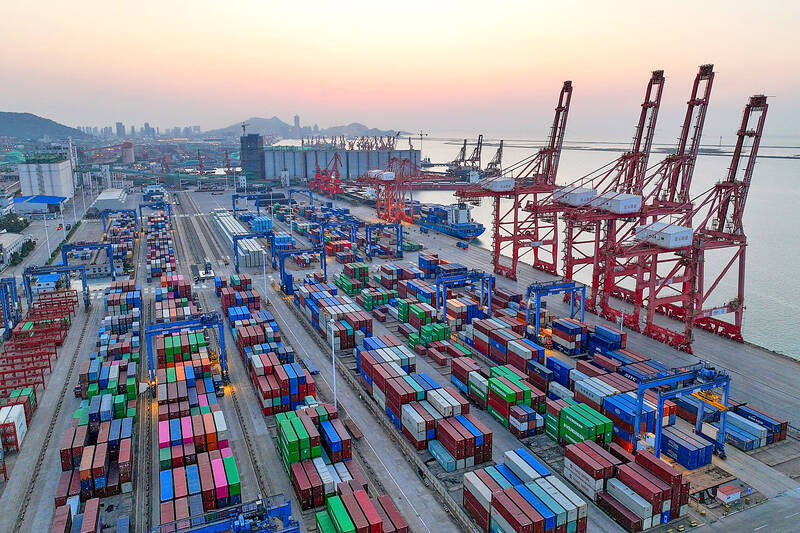Beijing is “evaluating” an offer from Washington to hold talks over US President Donald Trump’s 145 percent tariffs, the Chinese Ministry of Commerce said yesterday, although it warned the US not to engage in “extortion and coercion.”
Washington and Beijing have been locked in a cat-and-mouse game over tariffs, with both sides unwilling to be seen to back down in a trade war that has roiled global markets and upended supply chains.
The commerce ministry said the US has approached China to seek talks over Trump’s tariffs and Beijing’s door was open for discussions, signaling a potential de-escalation in the trade war. The statement comes a day after a social media account linked to Chinese state media said Washington had been seeking to start talks, and a week after Trump claimed discussions were already underway, which Beijing denied.

Photo: AFP
“The US has recently taken the initiative on many occasions to convey information to China through relevant parties, saying it hopes to talk with China,” the statement said, adding that Beijing was “evaluating this.”
“Attempting to use talks as a pretext to engage in coercion and extortion would not work,” it added.
The US should be prepared to take action in “correcting erroneous practices” and cancel unilateral tariffs, the ministry said, adding that Washington needed to show “sincerity” in negotiations.
The punishing US tariffs on many Chinese products saw Beijing respond last month with levies on imports of US goods of 125 percent, as Beijing labelled Trump’s tariff strategy “a joke.”
The tit-for-tat increases stand to make goods trade between the world’s two largest economies impossible, analysts said, with import duties beyond about 35 percent potentially wiping out Chinese exporters’ profit margins and making US products in China similarly exorbitant.
China has repeatedly denied it is seeking to negotiate a way out of the tariffs with the US, appearing instead to be betting that Washington would make the first move.
Trump’s decision to single out Beijing for hefty import duties comes at a particularly difficult time for China, which is struggling with deflation due to sluggish economic growth and a prolonged property crisis.
Beijing has expressed its anger at the tariffs, which it says are tantamount to bullying and cannot stop the rise of the world’s second-largest economy. Alongside leveraging its propaganda machine to hit back at the duties, China has quietly created a list of US-made products it would exempt from its retaliatory 125 percent tariffs — including select pharmaceuticals, microchips and jet engines — Reuters has reported.
As tensions between both sides fester, the Trump administration yesterday ended US duty-free access for low-value shipments from China and Hong Kong, known as “de minimis” exemptions.
On the US side, officials, including US Secretary of the Treasury Scott Bessent and White House economic adviser Kevin Hassett, have expressed hope for progress in easing trade tensions.
“I am confident that the Chinese will want to reach a deal. And as I said, this is going to be a multi-step process. First, we need to de-escalate, and then ... we will start focusing on a larger trade deal,” Bessent said in an interview with Fox Business Network this week.
Trump said on Wednesday he believed there was a “very good chance” his administration could do a deal with China, hours after Chinese President Xi Jinping (習近平) called on officials to take action to adjust to changes in the international environment, without explicitly mentioning the US.

The demise of the coal industry left the US’ Appalachian region in tatters, with lost jobs, spoiled water and countless kilometers of abandoned underground mines. Now entrepreneurs are eyeing the rural region with ambitious visions to rebuild its economy by converting old mines into solar power systems and data centers that could help fuel the increasing power demands of the artificial intelligence (AI) boom. One such project is underway by a non-profit team calling itself Energy DELTA (Discovery, Education, Learning and Technology Accelerator) Lab, which is looking to develop energy sources on about 26,305 hectares of old coal land in

Taiwan’s exports soared 56 percent year-on-year to an all-time high of US$64.05 billion last month, propelled by surging global demand for artificial intelligence (AI), high-performance computing and cloud service infrastructure, the Ministry of Finance said yesterday. Department of Statistics Director-General Beatrice Tsai (蔡美娜) called the figure an unexpected upside surprise, citing a wave of technology orders from overseas customers alongside the usual year-end shopping season for technology products. Growth is likely to remain strong this month, she said, projecting a 40 percent to 45 percent expansion on an annual basis. The outperformance could prompt the Directorate-General of Budget, Accounting and

Netflix on Friday faced fierce criticism over its blockbuster deal to acquire Warner Bros Discovery. The streaming giant is already viewed as a pariah in some Hollywood circles, largely due to its reluctance to release content in theaters and its disruption of traditional industry practices. As Netflix emerged as the likely winning bidder for Warner Bros — the studio behind Casablanca, the Harry Potter movies and Friends — Hollywood’s elite launched an aggressive campaign against the acquisition. Titanic director James Cameron called the buyout a “disaster,” while a group of prominent producers are lobbying US Congress to oppose the deal,

Two Chinese chipmakers are attracting strong retail investor demand, buoyed by industry peer Moore Threads Technology Co’s (摩爾線程) stellar debut. The retail portion of MetaX Integrated Circuits (Shanghai) Co’s (上海沐曦) upcoming initial public offering (IPO) was 2,986 times oversubscribed on Friday, according to a filing. Meanwhile, Beijing Onmicro Electronics Co (北京昂瑞微), which makes radio frequency chips, was 2,899 times oversubscribed on Friday, its filing showed. The bids coincided with Moore Threads’ trading debut, which surged 425 percent on Friday after raising 8 billion yuan (US$1.13 billion) on bets that the company could emerge as a viable local competitor to Nvidia